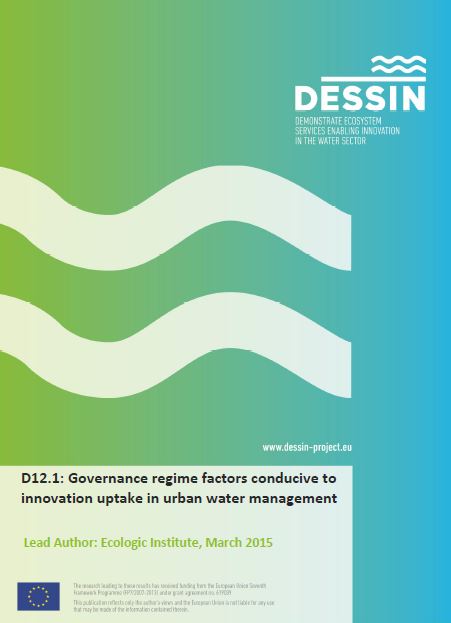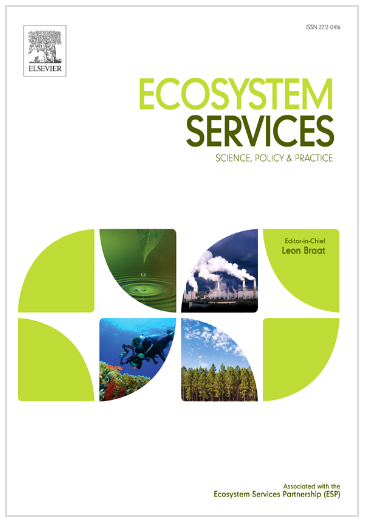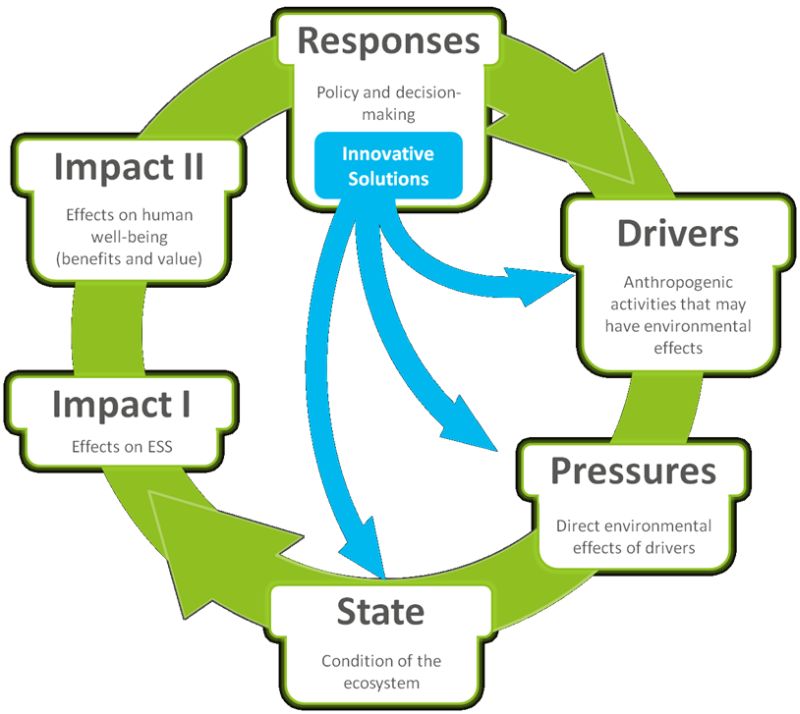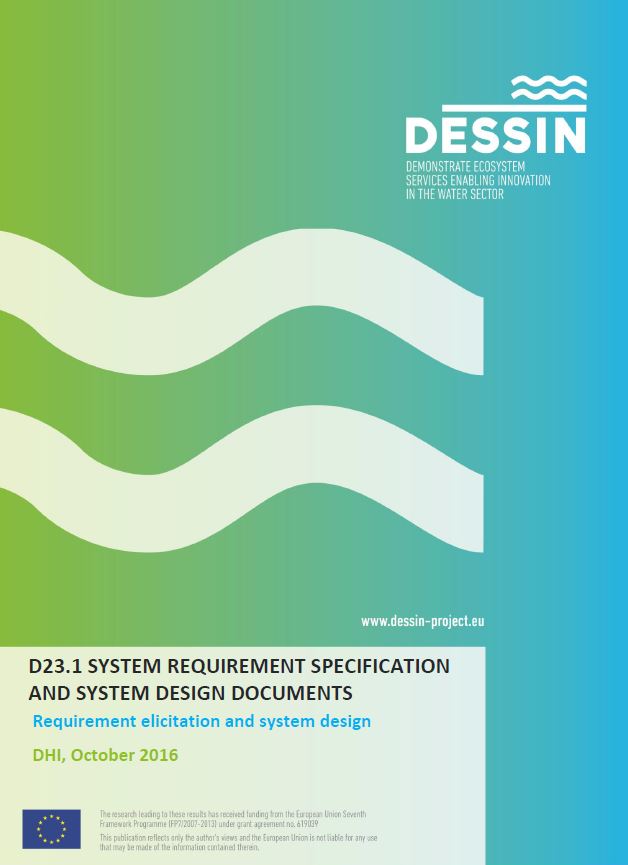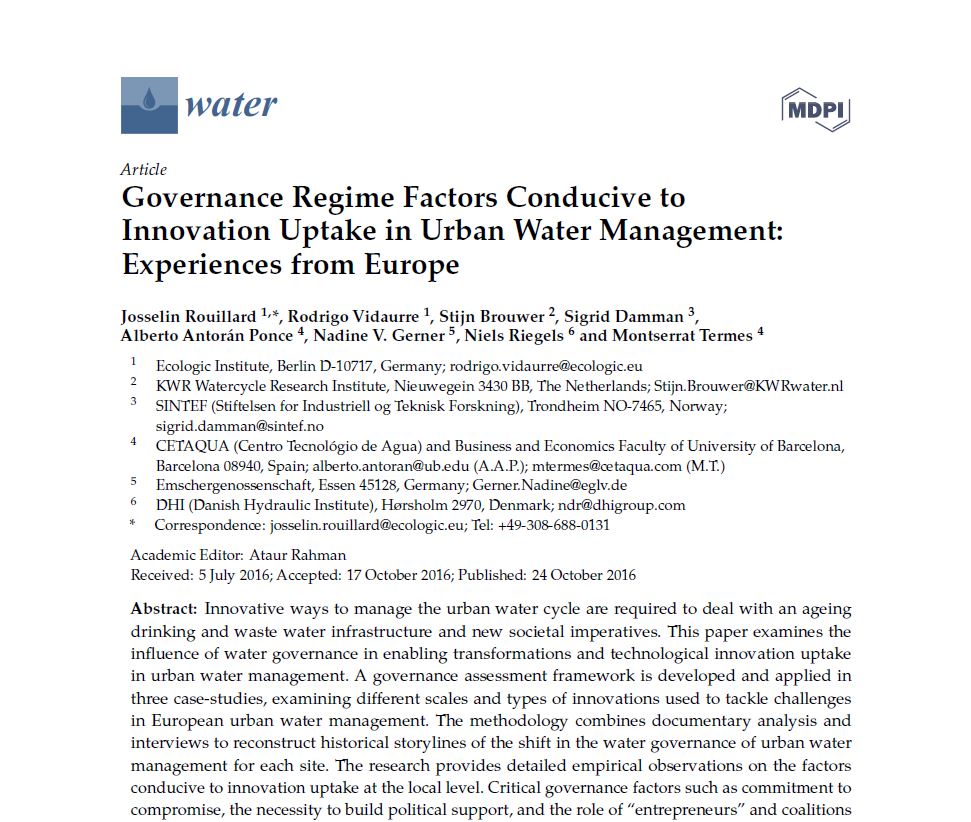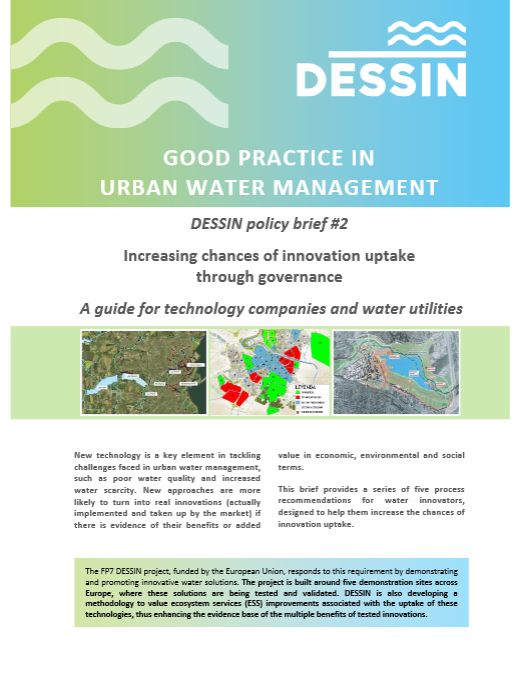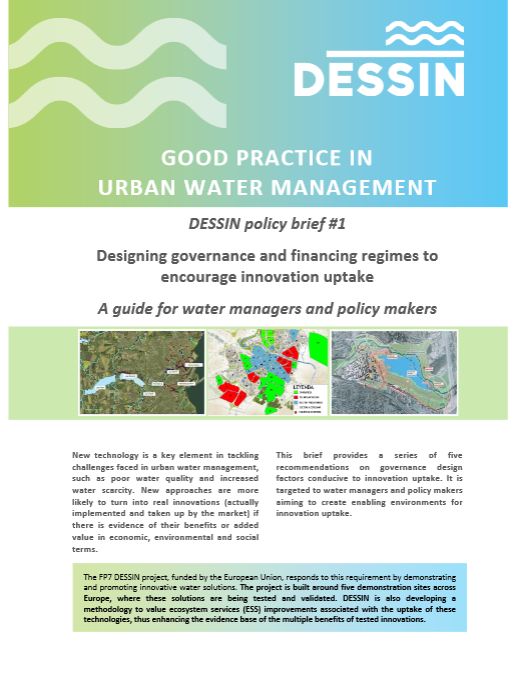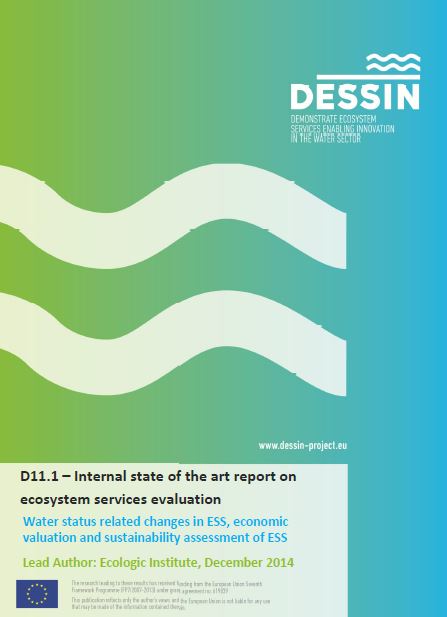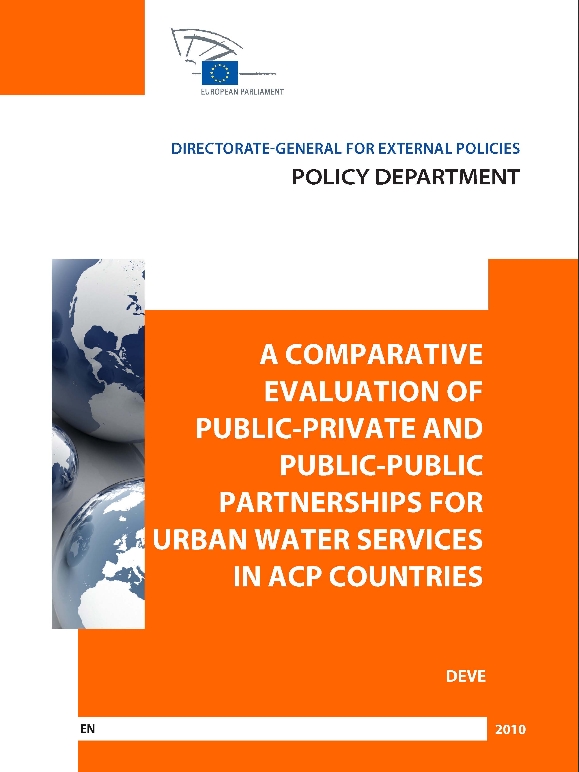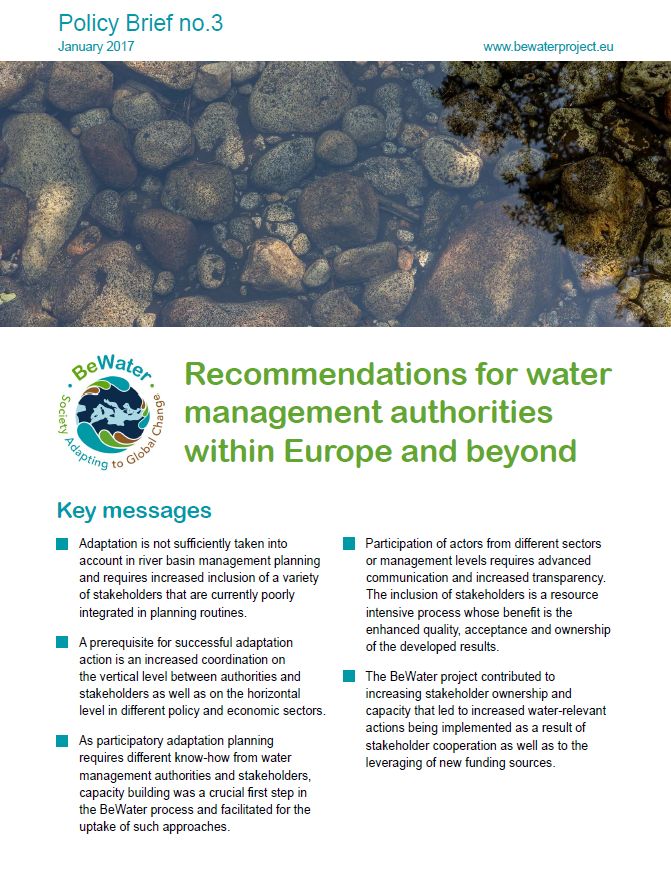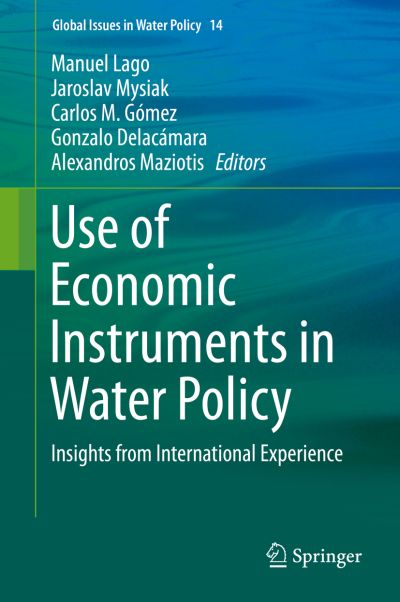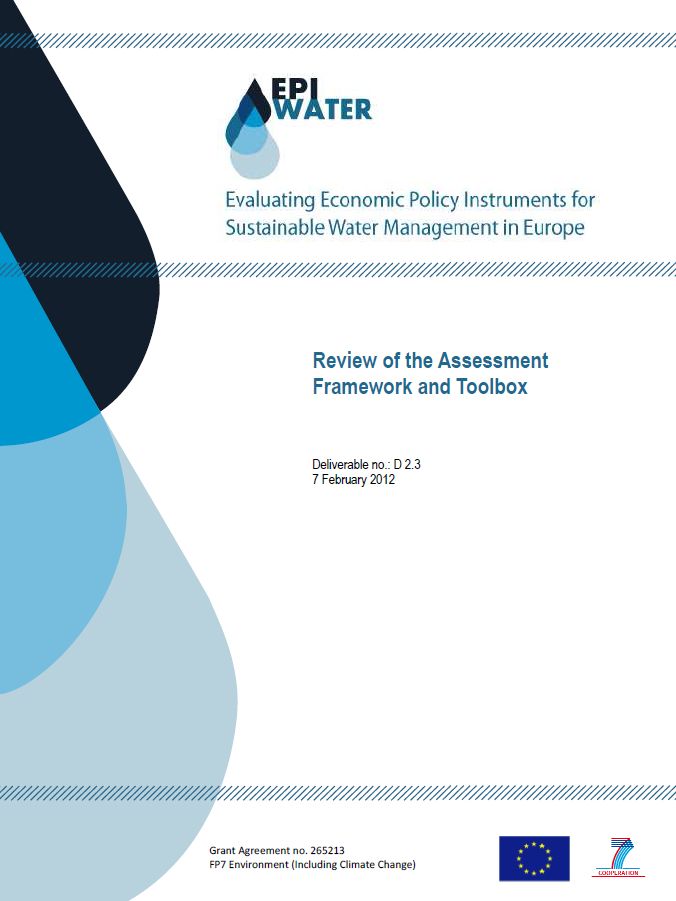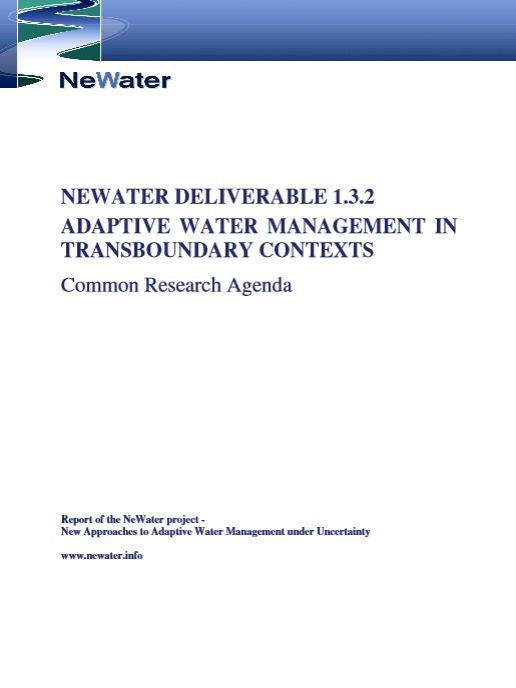Governance Regime Factors Conducive to Innovation Uptake in Urban Water Management
Deliverable 12.1, DESSIN
- Publication
- Citation
Rouillard, Josselin et.al. 2015: Governance Regime Factors Conducive to Innovation Uptake in Urban Water Management. Deliverable 12.1, DESSIN, European Union's Seventh Framework Programme for Research and Innovation Grant Agreement No. 619039.
This Deliverable reports the results of the assessment of governance factors conducive to innovation uptake carried within the context of the FP7 DESSIN project. The research is based on the analysis of innovation uptake in the three DESSIN mature case-study sites (i.e. Aarhus, Emscher, Ebro) which had welcomed some successful transformation in urban water management. A number of recommendations are presented in the conclusion to inspire future "entrepreneurs" in promoting innovation uptake in urban water management. The report is available for download.
Contact
- Language
-
English
- Authorship
-
Stijn Brouwer (KWR)Sigrid Damman (SINTEF)Alberto Antorán Ponce (CETaqua)Nadine V. Gerner (EG)Niels Riegels (DHI)Montserrat Termes (CETaqua)
- Funding
-
European Commission, Directorate-General Research & Innovation (DG Research & Innovation), International - Year
- Dimension
- 62 pp.
- Project
- Project ID
- Table of contents
-
Click to show full table of contents
EXECUTIVE SUMMARY
1. INTRODUCTION
1.1 What are DESSIN and WP12 objectives?
1.2 Innovations and governance in the context of DESSIN WP12
1.3 Assessing governance factors influencing innovation uptake in urban water management
2. A GOVERNANCE ASSESSMENT TOOL FOR INNOVATION UPTAKE IN URBAN WATER MANAGEMENT
2.1 A review of the literature related to innovation uptake in urban water management
2.1.1 Levels and scales
2.1.2 Actors and networks
2.1.3 Problem perceptions and goals ambitions
2.1.4 Strategies and instruments
2.1.5 Responsibilities and resources
2.2 The DESSIN governance assessment tool
3. DATA COLLECTION AND ANALYSIS
3.1 Selecting the focus of analysis
3.1.1 The Aarhus case-study
3.1.2 The Emscher case-study
3.1.3 The Zaragoza case-study
3.1.4 Comparing between sites
3.2 Data collection: documentary and interview data
3.3 Data analysis: answering the guide, developing narratives, comparing across sites
4. STORYLINES OF INNOVATION UPTAKE
4.1 The Aarhus case-study
4.2 The Emscher case-study
4.3 The Zaragoza case-study
5. LESSONS LEARNED FROM CROSS-COMPARATIVE ANALYSIS
5.1 Levels and scales
5.2 Actors and networks
5.3 Goals and ambition
5.4 Strategies and instruments
5.5 Responsibilities and resources
6. CONCLUSION AND RECOMMENDATIONS
7. REFERENCES . - Keywords
-
transitions, cities, sustainability, adaptation, water governanceEurope, Aarhus, Emscher, Zaragoza, Denmark, Germany, Spaincase study
Rouillard, Josselin; Vidaurre, Rodrigo; Brouwer, Stijn; Damman, Sigrid; Ponce, Alberto A.; Gerner, Nadine V.; Riegels, Niels; Termes, Montserrat. 2016. "Governance Regime Factors Conducive to Innovation Uptake in Urban Water Management: Experiences from Europe." Water 8, no. 10: 477.
Tucker, Josephine; Roger Calow; Darla Nickel and Thomas Thaler 2010: A Comparative Evaluation of Public-Private and Public-Public Partnerships for Urban Water Services in ACP Countries. European Parliament, Brussels.
Lukat, Evelyn et. al. 2017: Recommendations for Water Management Authorities within Europe and Beyond. [BeWater policy brief no.3].
Lago, Manuel et. al. 2015: Defining and Assessing Economic Policy Instruments for Sustainable Water Management. In: Lago, M., Mysiak, J., Gómez, C.M., Delacámara, G., Maziotis, A. (Eds.): Use of Economic Instruments in Water Policy. Insights from International Experience. Heidelberg: Springer International Publishing.
EEA (2014): "Public participation: contributing to better water management". EEA Report, Vol. 3, 64.
Zetland, David; Hans-Peter Weikard; Gonzalo Delacamra et al. 2012: Evaluating Economic Policy Instruments for Sustainable Water Management in Europe: Review of the Assessment Framework and Toolbox. Ecologic Institute.
Kraemer, R. Andreas; Zulma Guzmán Castro; Ronaldo Seroa da Motta and Clifford Russell 2003: Economic Instruments for Water Management: Experiences from Europe and Implications for Latin America and the Caribbean. Berlin: Ecologic.
Kranz, Nicole et al. 2005: NeWater deliverable 1.3.2 Adaptive Water Management in Transboundary contexts. Common Research Agenda. Ecologic, RBA, RIZA, Berlin.
